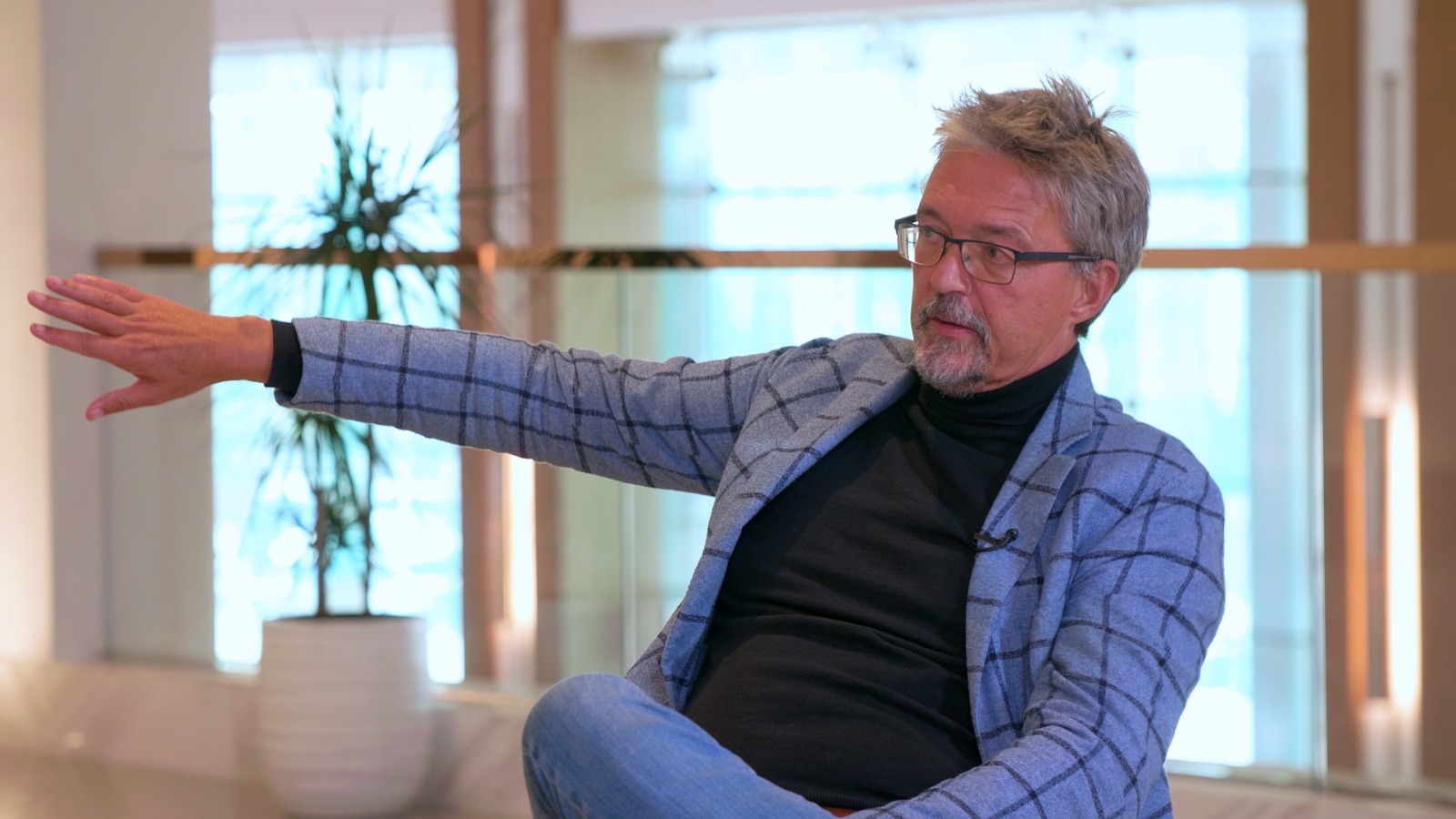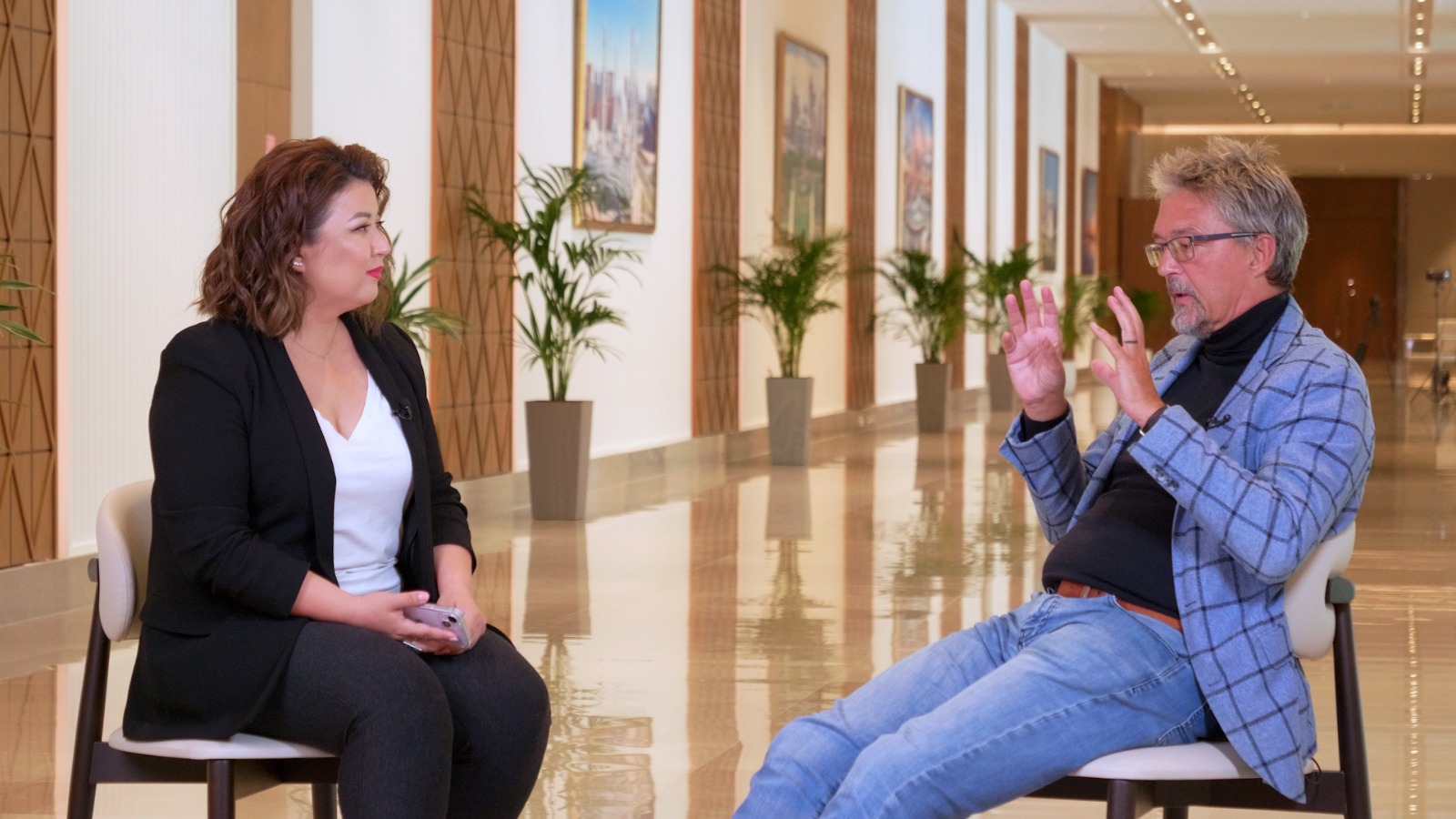ASTANA — Ron Immink, a positive futurologist and author, highlighted Kazakhstan’s strategic location as one of its most compelling features. In an interview with The Astana Times’ YouTube channel, he observed that Europeans often carry an inherent arrogance, perceiving themselves as central to the world. However, he noted that this balance of global influence is shifting eastward, positioning Kazakhstan advantageously at the heart of this new alignment.

Ron Immink. Photo credit: The Astana Times
“I think the real economic power is going to shift towards this region. You have a completely different cultural and historical outlook than we do,” he said.
Immink compared the traditional connections among Kazakhs—and Central Asians in general—to those among the Irish. As a Dutchman who lived in Ireland, he observed that the Irish are exceptionally skilled at building relationships. This coined the term “Irish cultural middleware” to describe this ability. He explained that when an Irish person joins an organization, they naturally begin bridging connections among people.
“I think you have the same capability. When I was working with the accelerator for Central Asia, I noticed you have a diaspora all over the world. There is somebody from Taiwan or somebody in the United States, so literally everywhere. This shows that you could become the cultural middleware for Central Asia,” he said.
Immink specializes in supporting startups and emerging entrepreneurs, with a strong focus on climate change initiatives and educational advancement.
Embracing new approaches to combat climate change
He highlighted that climate change encompasses a broad range of issues beyond carbon emissions, such as plastic pollution, water scarcity and soil erosion. Despite this complexity, he noted that approaches to these problems often remain overly uniform. Rather than solely emphasizing the fight against climate change, he suggested placing greater importance on education, equipping young people with the specific skills needed to address these diverse environmental challenges.

The Astana Times journalist Aida Haidar and Ron Immink during an interview. Photo credit: The Astana Times
“Climate change isn’t a linear issue; it’s exponential. There are tipping points, where effects keep accelerating faster and faster. On the other side, we have rapidly advancing technology. The question is whether this technology curve will catch up to the climate crisis in time, or whether it will fall short. If we act quickly, we’ll all survive—and that would be incredible. But if we’re not fast enough, we’re all doomed,” he said.
Immink emphasized a significant concern among experts: today’s education system is failing to prepare children for the future. According to him, the answer to whether the system meets future demands is a resounding, unmistakable “no.”
It is impossible to predict the future
When discussing the future, Immink cautioned against anyone claiming to predict it. In his view, any futurist who makes such a promise should be dismissed outright, as true future prediction is simply impossible.
“It’s multiple futures all the time,” he added.
Immink explained that entrepreneurship is closely tied to the ability to anticipate various possible futures, emphasizing that successful business planning requires a forward-thinking approach to shaping one’s enterprise for what lies ahead.
“We call it future framing. To future frame, you need to be situationally aware like Navy SEALs do, which means that you need to have a dashboard of things that you watch out for,” he explained.
On the importance of healthy news diet
He shared his morning routine, which he shares with his clients: each day begins with an information dashboard filled with curated sources. He uses tools like Google Alerts, where startups can input numerous relevant topics to receive daily updates. Alongside Google Alerts, he recommends subscribing to newsletters from places like Singularity University, MIT Review, and Stanford University, describing them as invaluable resources that start the day with fresh insights.
With a morning coffee in hand, he takes a moment to enjoy the Spanish sunshine before opening his dashboard to review all his alerts, setting a positive tone for the day.
By keeping himself “situationally aware,” Immink reads about remarkable advancements currently underway, highlighting technologies like quantum computing, teleportation, immortality, extended longevity, hybrid computing, robotics, and 3D and 4D printing. He marveled at how ideas once considered science fiction are rapidly becoming a reality, with breakthroughs emerging constantly.
As an avid reader of science fiction that imagines humanity’s future hundreds or even thousands of years ahead, he finds it difficult not to feel optimistic when witnessing the rapid pace of these innovations. Collaborating with pioneering startups, he added, only fuels that enthusiasm.
“Startups, by nature, are optimists,” he said.
Immink also highlighted the importance of following a healthy “information diet,” noting that most people’s current intake is “at the level of McDonald’s.”
“If you were eating McDonald’s every day for a year, you wouldn’t be very healthy. It’s the same with information. If you feed yourself quality information, good things come out of it,” he said.
Rethinking our economic model for tomorrow
Immink also discussed the economic model that humanity follows in many parts of the world, noting that significant changes in this model and our calculation methods are on the horizon. He pointed out that many startups he has worked with are no longer solely focused on profit.
“Every startup that I know of always has an impact element to it; they want to do something good for the world, and money is needed as an instrument to create positive change. So I think our whole mindset is starting to shift into something entirely different,” he explained.
He referenced “Techno-Socialism,” a book by Brett King, which argues that older generations, including himself, need to step aside and allow younger individuals to lead in the political system.
“They have a completely different value system than older generations. They are not driven by money; they are motivated by experience and impact. The myth of staying in one job forever is gone. Instead, you’ll need to be an entrepreneur in the labor market, possibly combined with universal basic income, and suddenly, everything will start to fit together,” he concluded.
For the complete conversation, stay tuned for the release of the full video interview on The Astana Times’ YouTube channel today.
